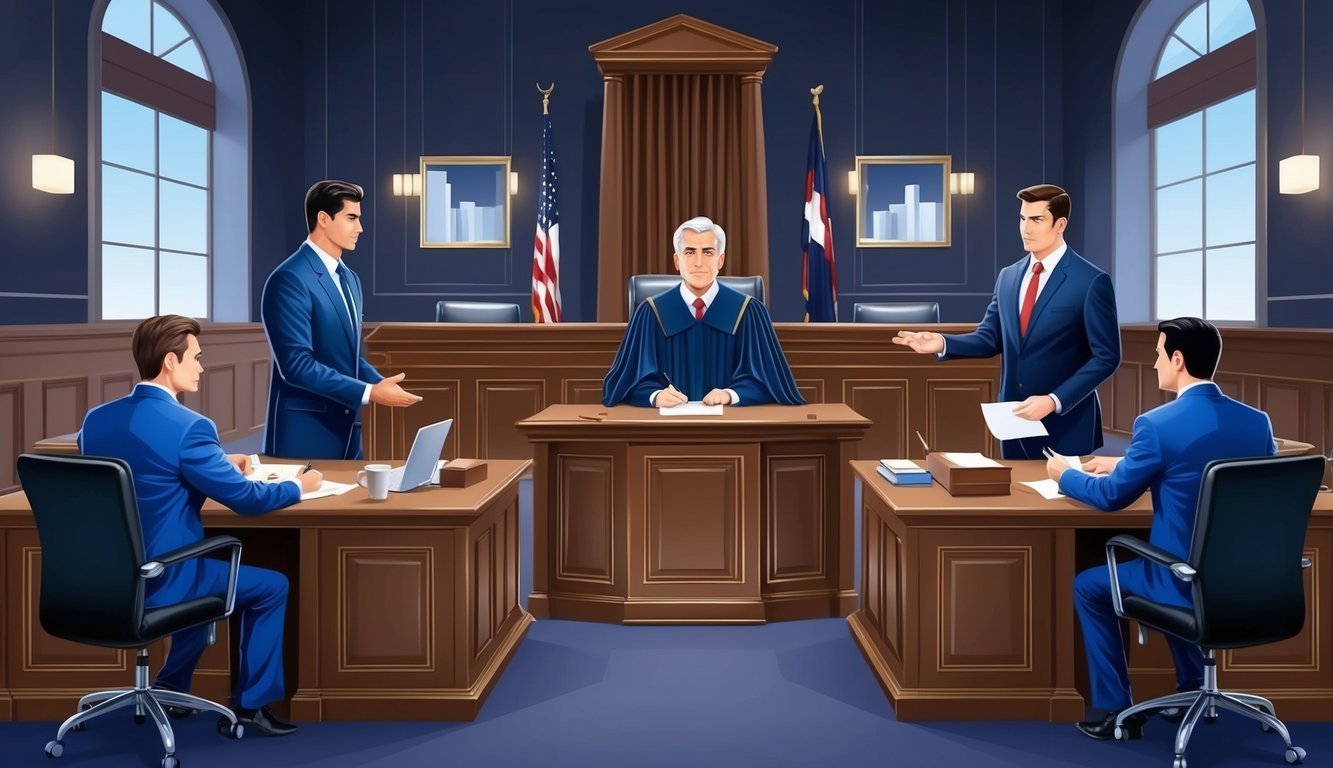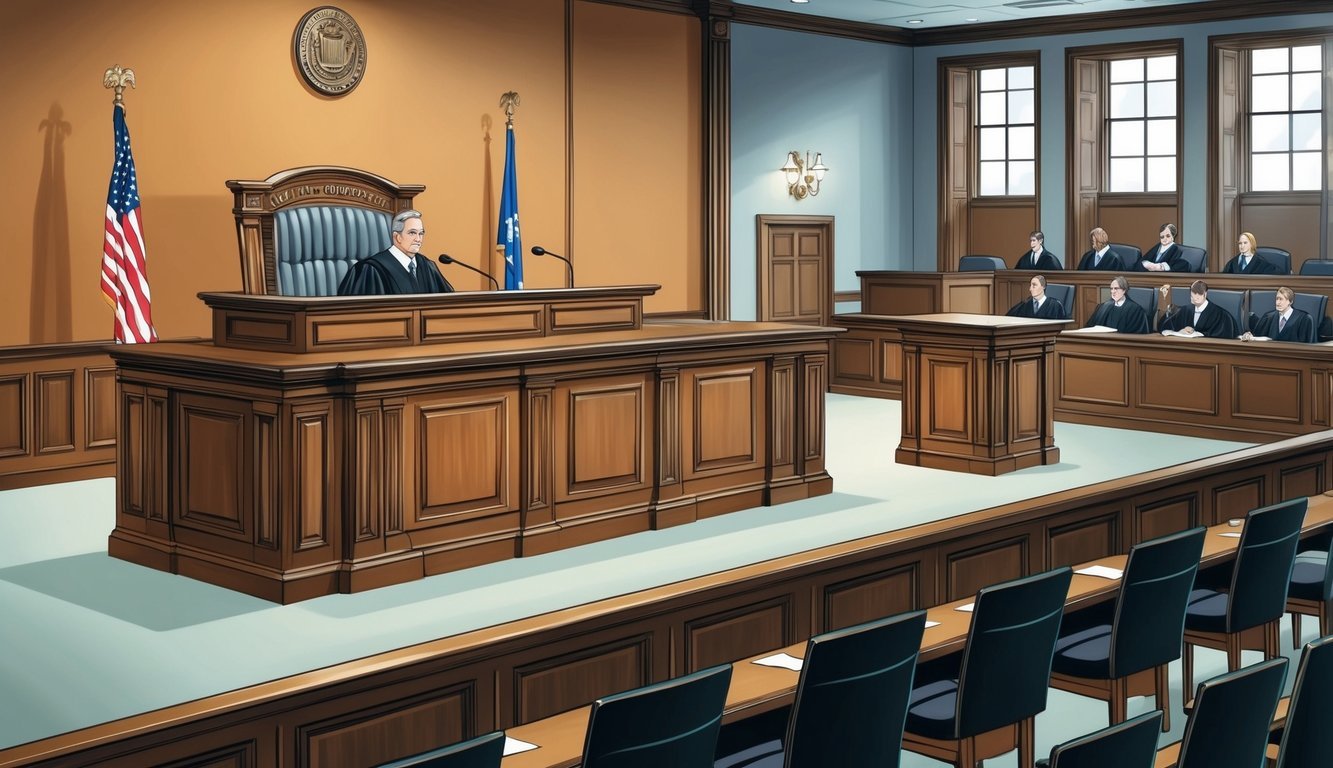Commercial litigation plays a crucial role in resolving business disputes through the legal system. It encompasses a wide range of conflicts, from contract breaches to intellectual property infringement.
Understanding the intricacies of commercial litigation can help you protect your business interests and navigate complex legal challenges effectively.
When faced with a commercial dispute, you have several options for resolution. While litigation is often seen as a last resort, it can be necessary to enforce your rights or seek compensation for damages.
The process typically involves filing a lawsuit, engaging in discovery, and potentially going to trial if a settlement cannot be reached.
Commercial litigation attorneys specialize in representing businesses in these legal matters. They can guide you through the complexities of the legal system, develop effective strategies, and work towards achieving favorable outcomes for your company.
Key Takeaways
- Commercial litigation helps resolve business disputes through the legal system
- The process involves filing lawsuits, discovery, and potentially going to trial
- Specialized attorneys can guide you through complex legal challenges and protect your interests
Understanding Commercial Litigation
Commercial litigation involves legal disputes between businesses or commercial entities. It encompasses a wide range of issues that can impact companies of all sizes and industries.
Definition and Scope
Commercial litigation refers to legal actions arising from business relationships and transactions. You may encounter these disputes in various contexts, from contract breaches to intellectual property infringement. The scope extends to conflicts between companies, partnerships, and individuals engaged in commercial activities.
Commercial litigation often involves complex legal and financial matters. You might face cases related to corporate governance, shareholder disagreements, or regulatory compliance issues. These disputes can significantly impact your business operations and reputation.
Courts play a crucial role in resolving commercial conflicts. While arbitration is an option, public courts offer distinct advantages in handling commercial disputes, including established legal precedents and transparent proceedings.
Types of Commercial Litigation
Commercial litigation encompasses numerous case types. You may encounter contract disputes, which are among the most common. These can involve disagreements over terms, performance, or breach of contractual obligations.
Other prevalent types include:
- Intellectual property disputes
- Antitrust and trade regulation cases
- Securities litigation
- Employment-related conflicts
- Fraud and misrepresentation claims
Business-to-business disputes form a significant portion of commercial litigation. You might find yourself involved in conflicts over product quality, service delivery, or payment issues.
Regulatory compliance cases are increasingly common. These involve allegations of violating industry-specific regulations or broader business laws.
The Litigation Process
The litigation process involves several key stages that unfold as a commercial dispute moves through the legal system. You’ll navigate filing a lawsuit, gathering evidence, and potentially presenting your case before a judge or jury.
Initiating a Lawsuit
To begin the litigation process, you must file a complaint with the appropriate court. This document outlines your claims against the defendant and the legal basis for your case. You’ll need to:
- Identify the proper jurisdiction and venue
- Draft a clear and concise statement of facts
- Specify the legal theories supporting your claims
- Request specific relief or damages
Once filed, the complaint is served to the defendant, who then has a set time to respond. Their response may include counterclaims or motions to dismiss, which you’ll need to address promptly.
Conducting Discovery
The discovery phase allows both parties to gather information and evidence relevant to the case. You’ll have several tools at your disposal:
- Interrogatories: Written questions the other party must answer under oath
- Depositions: Oral testimony given under oath, usually recorded by a court reporter
- Document requests: Demands for relevant records and communications
- Subpoenas: Court orders requiring third parties to provide information or testimony
Discovery in commercial disputes can be extensive and time-consuming. It’s crucial to work closely with your legal team to manage this process effectively and strategically.
Presenting the Case at Trial
If your case proceeds to trial, you’ll have the opportunity to present your arguments and evidence before a judge or jury. This stage involves:
- Opening statements outlining your case
- Examination and cross-examination of witnesses
- Presentation of physical and documentary evidence
- Closing arguments summarizing your position
Throughout the trial, you must adhere to court procedures and rules of evidence. Your legal team will guide you through this process, helping you present a compelling case.
Remember that many commercial disputes settle before reaching trial. Be prepared to engage in settlement negotiations at any point during the litigation process.
Common Commercial Disputes

Commercial disputes arise frequently in the business world, often involving complex legal issues and significant financial stakes. These conflicts can stem from various aspects of business operations and relationships.
Breach of Contract Claims
Contract breaches form the cornerstone of many commercial disputes. You may encounter situations where a party fails to fulfill their contractual obligations. This could involve non-payment, missed deadlines, or subpar performance.
Common law courts regularly handle such cases, interpreting contract terms and determining remedies. Damages awarded can include direct financial losses and, in some cases, consequential damages.
To protect your interests, always ensure clear contract drafting. Include specific performance metrics and dispute resolution clauses. These steps can help mitigate risks and provide a clear path forward if issues arise.
Intellectual Property Disputes
Your company’s intellectual assets are crucial to its success and competitive edge. IP disputes often involve patent infringement, trademark violations, or copyright issues.
These cases can be highly technical, requiring expert testimony and extensive evidence. You might need to prove ownership, demonstrate infringement, or defend against claims of IP theft.
International commercial litigation can complicate matters, as IP laws vary across jurisdictions. Consider implementing robust IP protection strategies, including regular audits and employee training.
Antitrust Litigation
Antitrust disputes focus on maintaining fair competition in the marketplace. You may face allegations of monopolistic practices, price-fixing, or other anti-competitive behaviors.
These cases often involve complex economic analyses and can have far-reaching implications for your business operations. Government agencies may initiate investigations, or competitors might file private lawsuits.
To avoid antitrust issues, carefully review your pricing strategies and market practices. Consult with legal experts to ensure compliance with relevant regulations in all jurisdictions where you operate.
Employment Issues
Employment-related disputes can arise from various situations, including discrimination claims, wage disputes, or wrongful termination allegations. These cases often involve sensitive issues and can impact your company’s reputation.
You must navigate complex employment laws, which can vary significantly by location. Resolving commercial disputes in this area often requires a delicate balance between protecting your business interests and maintaining positive employee relations.
Implement clear HR policies and procedures to mitigate risks. Regular training for managers and employees can help prevent many common employment issues. Consider alternative dispute resolution methods, such as mediation, to resolve conflicts efficiently.
Specialized Areas of Commercial Litigation

Commercial litigation encompasses various specialized fields that require unique expertise. These areas address complex legal challenges in specific industries and sectors.
Securities Litigation
Securities litigation involves disputes related to financial instruments and investments. You may encounter cases involving allegations of fraud, misrepresentation, or insider trading. Common issues include:
- Shareholder class actions
- Regulatory investigations
- Broker-dealer disputes
Securities litigation often involves complex financial transactions and requires a deep understanding of securities laws and regulations. You’ll need to analyze intricate financial documents and work closely with experts in finance and accounting.
Environmental Law
Environmental law litigation focuses on disputes related to environmental protection and compliance. You’ll handle cases involving:
- Pollution and contamination claims
- Regulatory compliance issues
- Natural resource damages
This field requires you to stay updated on rapidly evolving environmental regulations. You may work with scientific experts to assess environmental impacts and develop remediation strategies.
Privacy and Data Security
Privacy and data security litigation addresses the growing concerns surrounding digital information protection. You’ll encounter cases involving:
- Data breaches
- Consumer privacy violations
- Regulatory compliance issues
This area demands a strong understanding of rapidly evolving technology and data protection laws. You’ll need to work closely with IT experts to analyze complex digital evidence and develop effective legal strategies.
Alternative Dispute Resolution

Alternative dispute resolution offers efficient ways to resolve commercial conflicts outside of traditional litigation. These methods can save time and money while preserving business relationships.
Negotiation
Negotiation allows you to directly address disputes with the other party. You maintain control over the outcome and can craft mutually beneficial solutions.
To negotiate effectively, prepare thoroughly by identifying your goals and potential areas of compromise. Consider the other party’s interests and motivations. Aim for a win-win resolution that satisfies both sides.
Active listening and clear communication are crucial. Be willing to explore creative options. Skilled negotiators often employ techniques like anchoring and framing to influence the discussion.
You may find it helpful to engage a professional negotiator for complex disputes. Remember that successful negotiation requires flexibility and patience.
Mediation
In mediation, a neutral third party facilitates discussions between you and the opposing party. The mediator helps identify issues, clarify interests, and guide you toward a resolution. You retain decision-making power throughout the process.
Mediation offers a confidential and informal setting. This can help preserve business relationships and allow for more open dialogue.
The mediator may meet with each party separately to understand positions and explore settlement options.
You can typically resolve disputes more quickly and cost-effectively through mediation than litigation. The flexible nature of mediation allows for creative solutions tailored to your specific situation. If mediation is unsuccessful, you can still pursue other dispute resolution methods.
Arbitration
Arbitration involves presenting your case to one or more impartial arbitrators who make a binding decision. This process is more formal than mediation but less rigid than court proceedings.
You and the other party agree on the arbitrator(s) and the rules governing the process.
Arbitration often provides a faster resolution than litigation. It can be particularly useful for complex commercial disputes involving technical or industry-specific issues. Arbitrators with relevant expertise can be selected.
You may have limited grounds for appealing an arbitration decision, so consider this finality when choosing arbitration. The process is typically private, allowing you to maintain confidentiality. Costs can vary but are often lower than full-scale litigation.
The Role of a Commercial Litigation Attorney

Commercial litigation attorneys play a crucial role in resolving complex business disputes. They offer expert guidance, represent clients in court, and strive for successful outcomes in legal matters.
Advisory and Consultation
You provide valuable legal advice to businesses facing potential disputes as a commercial litigation attorney. Your expertise helps clients navigate complex legal landscapes and make informed decisions.
You analyze contracts, review business practices, and identify potential legal risks. By offering proactive guidance, you help companies avoid costly litigation when possible.
When disputes arise, you assess the merits of each case and advise on the best course of action. This may involve negotiation strategies, alternative dispute resolution methods, or preparing for trial.
Your role as a trusted advisor is to protect your clients’ interests and minimize legal exposure. You translate complex legal concepts into actionable insights for business leaders.
Representation in Court
When litigation becomes necessary, you serve as your client’s advocate in court proceedings. You craft compelling legal arguments and present evidence to support your case.
Your responsibilities include:
- Drafting and filing legal documents
- Conducting thorough legal research
- Preparing witnesses for testimony
- Cross-examining opposing witnesses
- Delivering opening and closing statements
In the courtroom, you articulate your client’s position clearly and persuasively. Your goal is to achieve the best possible outcome through skilled litigation techniques.
You also handle pre-trial motions, settlement negotiations, and appeals when necessary. Your courtroom presence and legal acumen are essential to protecting your client’s rights.
Record of Success
As a commercial litigation attorney, your track record of successful outcomes is crucial. Clients seek your services based on your ability to achieve favorable results in complex business disputes.
You maintain a portfolio of case wins and settlements that demonstrate your legal prowess. This may include:
- Monetary awards secured for clients
- Successful defense against claims
- Precedent-setting rulings
- Efficient dispute resolutions
Your success rate in various industries and types of commercial disputes showcases your versatility. Clients rely on your proven ability to navigate intricate legal challenges and deliver results.
By consistently achieving positive outcomes, you build a reputation as a trusted and effective advocate for businesses in legal matters.
Legal Strategies in Commercial Litigation

Effective legal strategies can significantly impact the outcome of commercial disputes. Businesses must carefully navigate risk management, regulatory compliance, and growth considerations to protect their interests.
Risk Management
You should implement proactive risk management strategies to minimize potential litigation. Identifying and addressing potential legal issues before they escalate is crucial.
Conduct regular legal audits to assess vulnerabilities in your contracts, operations, and business practices.
Develop comprehensive dispute resolution clauses in your agreements. Consider alternative dispute resolution methods like mediation or arbitration to potentially reduce costs and time compared to traditional litigation.
Create robust document retention policies. Preserve relevant records and communications that may be crucial evidence in future disputes. Train employees on proper documentation practices to strengthen your position in potential litigation.
Compliance and Regulation
Stay ahead of regulatory changes affecting your industry. Establish a dedicated compliance team or designate responsible individuals to monitor and interpret new laws and regulations.
Implement comprehensive compliance programs tailored to your business. Regularly review and update these programs to reflect evolving legal requirements and industry best practices.
Conduct internal audits to ensure adherence to regulatory standards. Address any non-compliance issues promptly to mitigate potential legal risks.
Consider engaging external legal counsel for complex compliance matters. Their expertise can help you navigate intricate regulatory landscapes and avoid costly missteps.
Growth and Expansion
As you pursue growth opportunities, carefully assess the legal implications of your expansion strategies. Conduct thorough due diligence when entering new markets or engaging in mergers and acquisitions.
Develop a strong intellectual property protection strategy. Safeguard your innovations, trademarks, and trade secrets to maintain a competitive edge and prevent potential infringement disputes.
Craft clear and enforceable contracts with partners, suppliers, and customers. Well-drafted agreements can help prevent misunderstandings and reduce the likelihood of costly litigation.
Consider the legal implications of your digital presence and e-commerce activities. Stay informed about data privacy regulations and cybersecurity requirements to protect your business and customers.
Complex Commercial Litigation

Complex commercial litigation involves intricate legal disputes between businesses. These cases often require specialized knowledge and strategic approaches to navigate effectively.
Class Actions
Class action lawsuits allow multiple plaintiffs with similar claims to join together in a single case. You may encounter class actions in various industries, from consumer products to financial services.
These suits can be challenging to manage due to the large number of plaintiffs involved.
Class actions often require extensive discovery processes and expert testimony. You’ll need to prepare for lengthy proceedings and potentially high-stakes outcomes.
Courts typically scrutinize class certification requirements closely, so you must build a strong case for commonality and typicality among class members.
Multi-Jurisdictional Disputes
When your business operates across borders, you may face multi-jurisdictional disputes. These cases involve legal issues spanning different states or countries, each with its own laws and procedures.
You’ll need to navigate conflicting regulations and determine the appropriate forum for your case. International litigation can be particularly complex, requiring knowledge of foreign legal systems and treaty obligations.
Consider factors like enforceability of judgments and choice of law provisions in contracts.
Alternative dispute resolution methods, such as international arbitration, may offer more flexibility in multi-jurisdictional cases.
High-Stake Negotiations
High-stake negotiations in complex commercial litigation can significantly impact your business. These discussions often involve substantial financial implications or critical business relationships.
You must approach these negotiations with a clear strategy and thorough preparation. Understanding your opponent’s position and potential weaknesses is crucial.
Consider engaging expert witnesses to strengthen your arguments.
Be prepared for intense pressure and protracted discussions. You may need to explore creative settlement options or alternative dispute resolution methods.
Remember that the outcome of these negotiations can have long-lasting effects on your company’s future.
Protecting Business Rights and Assets

Safeguarding your company’s intellectual property and resolving internal conflicts are crucial for long-term success. Effective strategies can shield your trade secrets, address shareholder disagreements, and ensure proper insurance coverage.
Trade Secrets and Proprietary Information
Your trade secrets are the lifeblood of your business. To protect them, implement stringent confidentiality agreements and limit access to sensitive information.
Establish clear protocols for handling proprietary data. This includes using encryption, secure file storage, and regular employee training on information security.
Consider utilizing non-disclosure agreements when collaborating with external partners. These legally binding contracts can help preserve your competitive edge.
Regular audits of your information security practices can identify vulnerabilities. Address any weaknesses promptly to maintain the integrity of your trade secrets.
Shareholder Disputes
Shareholder conflicts can disrupt your business operations. To mitigate risks, ensure your company’s bylaws clearly outline dispute resolution procedures.
Consider implementing a shareholder agreement that addresses potential areas of conflict. This might include provisions for share transfers, decision-making processes, and exit strategies.
When disputes arise, prioritize mediation or arbitration before resorting to litigation. These alternative dispute resolution methods can often lead to quicker, more cost-effective solutions.
In cases where litigation is unavoidable, work closely with experienced legal counsel. They can help you navigate the complexities of corporate litigation and protect your interests.
Insurance Coverage
Comprehensive insurance coverage is essential for protecting your business assets. Regularly review and update your policies to ensure they align with your current needs.
Consider a range of coverage options, including general liability, professional liability, and property insurance. Tailor your coverage to your specific industry risks.
Cyber insurance is increasingly important in today’s digital landscape. This coverage can help mitigate losses from data breaches or cyber attacks.
Work with a knowledgeable insurance broker to identify potential gaps in your coverage. They can help you develop a robust risk management strategy tailored to your business.
Remember to document all your assets and keep detailed records. This information can be invaluable when filing claims or updating your coverage.
Commercial Litigation Outcomes

Commercial litigation outcomes significantly impact businesses financially and operationally. These outcomes shape future strategies and influence business relationships.
Settlements
Settlements often provide a quicker resolution to commercial disputes. You may find that settling out of court can save time and resources. It allows you to maintain control over the outcome and preserve business relationships.
Confidentiality is a key benefit of settlements. You can protect sensitive information from public disclosure.
Settlement agreements may include financial compensation, changes in business practices, or both. You should carefully consider the terms to ensure they align with your long-term objectives.
Verdicts
When litigation proceeds to trial, verdicts determine the outcome. You face higher risks and potential rewards compared to settlements.
Court decisions can result in monetary damages, injunctive relief, or dismissal of claims. The outcome may significantly impact your financial position and business operations.
Verdicts can set legal precedents, influencing future cases in your industry. You should be prepared for potential appeals, which can extend the litigation process and associated costs.
Enforcement of Judgments
Obtaining a favorable verdict is only part of the process. You must also consider the challenges of enforcing judgments.
Domestic enforcement typically involves working with local courts and law enforcement. For international disputes, you may face additional complexities due to varying legal systems and enforcement mechanisms.
Asset tracing and recovery can be crucial in collecting awarded damages. You might need to navigate multiple jurisdictions to locate and seize assets.
Consider the potential for post-judgment motions or appeals, which can delay or complicate enforcement efforts. Effective strategies for judgment enforcement are essential to realizing the benefits of litigation success.
Frequently Asked Questions

Commercial litigation involves complex legal disputes between businesses. Understanding key aspects can help companies navigate these challenging situations more effectively.
What qualifications should I look for in a commercial litigation attorney?
You should seek an attorney with extensive experience in business law and litigation. Look for someone who has handled cases similar to yours. Strong negotiation skills and a deep understanding of your industry are crucial qualities.
How does commercial litigation differ from civil litigation?
Commercial litigation focuses on disputes between businesses, while civil litigation covers a broader range of legal issues. Commercial disputes often involve complex financial matters and business relationships.
What are common types of disputes involved in commercial litigation?
Breach of contract is a frequent cause of commercial litigation. Other common issues include intellectual property disputes, partnership disagreements, and fraud allegations. Employment disputes and regulatory compliance matters also fall under this category.
What are the stages of a commercial litigation process?
The process typically begins with filing a complaint. This is followed by discovery, where both parties gather evidence. Pre-trial motions and negotiations may occur next. If a settlement isn’t reached, the case proceeds to trial.
What is considered a business tort in the context of commercial litigation?
Business torts include unfair competition, interference with contractual relations, and misappropriation of trade secrets. Defamation and fraudulent misrepresentation are also examples of business torts that can lead to litigation.
How can a party effectively prepare for commercial litigation?
First, gather all relevant documents and communications. Then, consult with your legal team early to develop a strategy. Also, consider the potential costs and benefits of litigation versus settlement. Lastly, preserve all evidence that may be relevant to the case.

